Exploring Champion Creation in Zelda's Lore
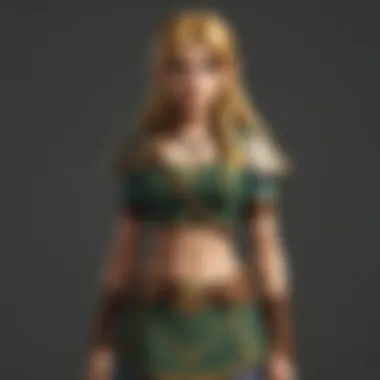
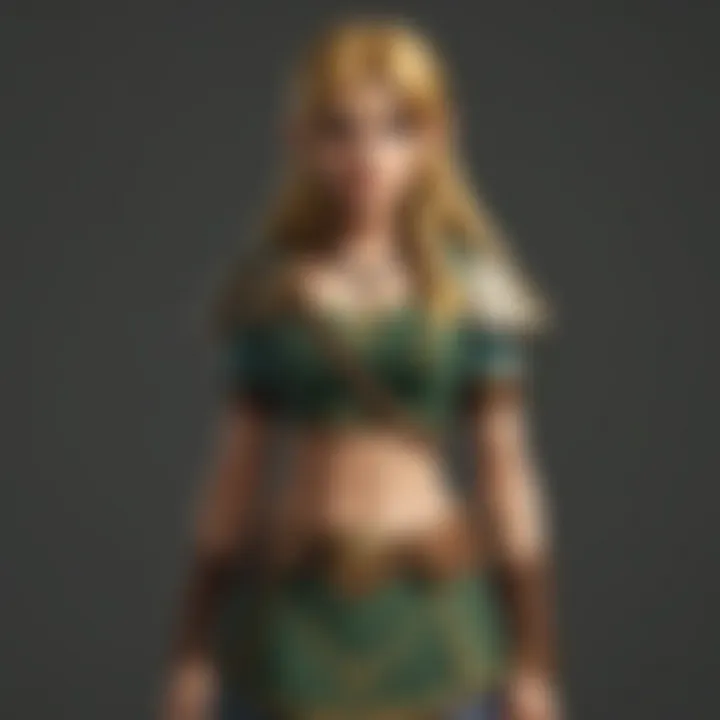
Intro
The world of The Legend of Zelda has captivated players for decades, weaving a rich tapestry of lore, character depth, and innovative gameplay. At the heart of this franchise lies the intriguing process of champion creation. Each champion in Hyrule represents not just a character but a cornerstone of the narrative, bringing unique stories and skills that define the gameplay experience.
In this exploration, we will delve into the historical context of these champions, their attributes, and the roles they play in the unfolding adventures across various titles. By peeling back the layers of their development, we can see how the choices made by creators influence the legacy of these heroes, leaving indelible marks on both the plot and gameplay.
Understanding the crafting of champions in this beloved universe opens the gateway to a deeper appreciation for the stories told within its immersive worlds. We'll cover fundamental aspects like character evolution, the artistic decisions that shape these legends, and the gameplay mechanics intricately tied to their contributions.
Join me as we embark on this journey to uncover what makes each champion not merely a figure in battle, but a storied entity that resonates deeply with fans of the franchise.
Prolusion to Champion Creation in Zelda
Creating champions in the Legend of Zelda universe is a craft that goes beyond mere character design. It’s an intricate weaving of history, personality, and narrative that enriches the entire tapestry of Hyrule. Understanding this process sheds light on why these characters resonate with players and contribute so significantly to the series' allure. This section will delve into the importance of champions, the elements that contribute to their creation, and the thoughtful considerations that accompany their design.
Understanding Champions
At its core, a champion in the Zelda universe serves as a beacon of hope and resilience. Champions are not just battle-ready heroes; they often embody the values and cultures of the different races within Hyrule. For instance, a character like Mipha, the Zora Champion, symbolizes grace and healing, while Daruk, the Goron protector, represents strength and unwavering loyalty. These attributes are what make champions truly unique; they resonate profoundly with players who see themselves reflected in these characters.
It’s vital to recognize that champions are often crafted with deep narrative layers. Each champion comes with their specific skills, and backgrounds, adding richness to their character. This multi-dimensionality is essential in engaging players, drawing them into the world of Hyrule as they learn about these larger-than-life figures. Not only do they play pivotal roles in gameplay, but they also pull players deeper into the lore of the universe. The distinction of each champion and their journey creates a robust fabric, leading players to appreciate the artistry behind their creation.
The Role of Champions in Hyrule
Champions act as central figures in Hyrule's mythology, demonstrating the various strengths and weaknesses of the land’s diverse inhabitants. The providence they hold often shapes the fate of Hyrule itself. For instance, the four champions in Breath of the Wild not only operate in service of Princess Zelda but also symbolize the cooperation between different races, underscoring the theme of unity against adversity.
Their challenges and accomplishments provide rich storytelling opportunities. Each champion faces unique obstacles that reflect their personal struggles. Take Revali, for instance; his pride often conflicts with his desire to support others. This mix of human traits, both admirable and flawed, breathes life into champions and connects them to players on a deeper level.
Moreover, champions are not merely side characters; they are pivotal in driving the main plot forward. Their actions, decisions, and relationships with Link and Princess Zelda craft a compelling narrative. In essence, they help elevate the stakes of the story, making the journey to liberate Hyrule an emotional as well as a physical adventure for the player.
Ultimately, champion creation is not a simple mechanical process. It involves a thoughtful examination of abilities, cultural significance, and narrative necessity. In a series renowned for its storytelling, the champions are one of the most effective avenues to explore the complex themes that resonate throughout Hyrule.
“The strength of a champion is not just measured in combat, but in the connection they forge with the world around them.”
Historical Context of Champions
The historical context surrounding champions in the Zelda universe is not merely a backdrop but serves as a vital thread interwoven into the fabric of Hyrule’s mythology. Understanding this context sheds light on the significance of each champion, their motivations, and the legacy they leave behind. The champions offer a lens through which players can appreciate the expanded lore and depth of Zelda's narrative, revealing that these figures are not just warriors but embodiments of hope and resilience. They represent a continuum of legends that shape the identity of Hyrule.
Legends from the Past
The champions of Hyrule have deep roots in the lore, often reflecting overarching themes from various cultural inspirations. Each champion, from Link to those in Breath of the Wild, carries elements of historical legends that resonate with players. These stories include tales of valor, sacrifice, and the eternal battle against darkness. The connection to past legends allows players to draw parallels between the game's world and our own history, fostering a sense of resonance.
For example, Mipha's backstory embodies the archetype of the healer, prevalent in global folklore. Her narrative explores themes of compassion juxtaposed with the burdens of leadership. Similarly, Urbosa reflects the respected warrior archetype often represented in legendary tales, instilling strength and unity in her tribe. The legends of these champions illustrate how personal narratives interplay with the larger mythos of Hyrule.
The Evolution of Champions Over Time
As the Zelda series progressed, the portrayal of champions evolved both in terms of gameplay and character depth. Initial representations often leaned toward straightforward heroics, where the champion was primarily a hero with little backstory. However, recent titles like Breath of the Wild have significantly expanded these narratives, showcasing complex backgrounds that influence their abilities and motivations.
The champions' evolution reflects advancements in game design and storytelling techniques, which empower players to engage with characters on a deeper level. Abilities like Revali’s wind or Daruk’s protection not only serve practical gameplay functions but also symbolize their unique contributions to Hyrule’s overall struggle.
Furthermore, the diversity among the champions has broadened—bringing in different races and cultures within Hyrule. Each champion embodies traits representative of their people, enhancing the narrative’s richness while offering parallels that players can appreciate. This continual evolution ensures that champions remain relevant and compelling as the franchise looks forward to future innovations and stories.
Key Figures in Champion Creation
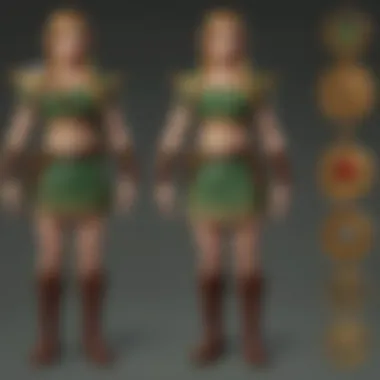
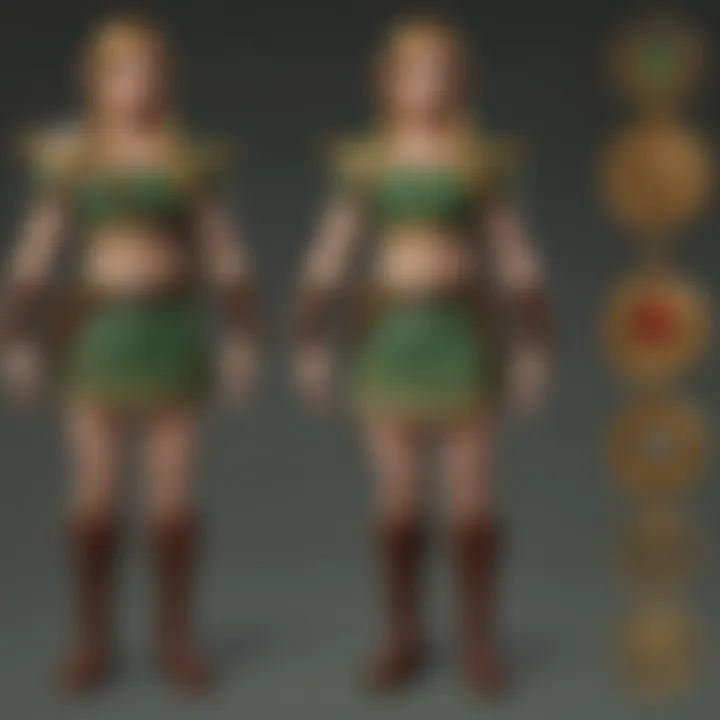
The crafting of champions in the Zelda universe is not just about the individual characters themselves; it hinges on the key figures who play an essential role in shaping these champions. These influential personas provide depth, motivation, and a narrative framework that elevates the entire story of Hyrule. As champions arise from unique circumstances and relationships, understanding these figures offers insight into the richness of the Zelda lore.
The involvement of pivotal characters, such as Princess Zelda and Link, can make or break the perception of the champions crafted throughout the series. These figures contribute not only to the champions' abilities but also to their emotional landscapes, providing fans with a deeper connection to the gameplay and storylines that unfold.
Thus, examining the relationships and influences of these key figures is vital for understanding how champions are created and how they resonate with audiences.
The Influence of Princess Zelda
Princess Zelda stands as a cornerstone in the creation of champions. Her character embodies wisdom and strength, often acting as a guiding light for the heroes of Hyrule. In various titles, she transcends the role of a mere damsel in distress, evolving into a powerful force essential in the fight against evil.
Consider the events in "Breath of the Wild." Zelda's determination to unlock her powers creates ripples that directly impact the formation of the four champions. Her struggle with her own abilities sets the stage for a more complex narrative, where champions like Mipha and Revali find their paths intertwined with her destiny. The champions serve not just as warriors in Link's quests, but as protectors of the realms they embody, deeply rooted in the lore that Zelda shapes.
Through her trials and tribulations, Zelda inspires the champions by offering them purpose. Each champion's allegiance to Zelda provides the crucial backdrop against which their stories develop, forming an essential part of Hyrule's larger narrative tapestry.
"Zelda herself becomes a champion of sorts, embracing her role in the eternal cycle of calamity and renewal within Hyrule. Her influence is felt through the ages, guiding not only Link but the champions themselves."
The Impact of Link as the Hero
Link's role as the hero is undeniably the most significant element in the crafting of champions. His journey is often filled with peril, but it is his unwavering spirit that inspires those around him, including the champions who rise to join him in battle. The camaraderie and shared struggles between Link and the champions create a bond that enhances the gameplay and storytelling.
In titles like "Ocarina of Time," the champions faced by Link are shaped by their encounters with him. Each character, reflecting a piece of Link's courage, gains unique attributes and abilities that serve the greater good. Link's resilience against darkness catalyzes their growth, pushing them to unleash their full potential.
Moreover, Link embodies the essence of the 'Hero's Journey' archetype, cementing him as a pivotal figure in champion creation. His friendships and alliances foster environments where champions can flourish, showcasing different facets of bravery, sacrifice, and loyalty.
In many ways, Link, through his adventures, becomes a mirror reflecting the strengths and qualities that define each champion. Without Link's influence, Hyrule might never have known champions in the capacity they grace the world today.
By examining the connections and implications of these key figures, one can discern how their qualities not only shape champions but also enhance the immersive storytelling that the Zelda franchise is renowned for.
Notable Champions Across the Franchise
In the expansive world of the The Legend of Zelda series, champions play a pivotal role in shaping the rich narrative and gameplay experience. They are not just background characters; they are warriors and leaders who embody the essence of their respective races and contribute uniquely to the intricate lore of Hyrule. Each champion carries a story that intertwines with the land, the people, and the ongoing battle against the forces of evil. They exemplify courage, resilience, and sacrifice, making their contributions essential in various episodes of Link's journey.
Throughout the franchise, notable champions bring distinct abilities and cultural backgrounds, which adds depth to gameplay and enriches the storytelling. These characters resonate with players, often leaving lasting impressions that go beyond just being allies. Their existence helps to accentuate the world-building aspects of the game and offers avenues for exploration into themes of legacy, fate, and camaraderie. The tales of these heroes, specifically in Breath of the Wild, reveal how unity and individual prowess can stand against overwhelming darkness.
Champions of Breath of the Wild
- Revali: The Rito Warrior
Revali serves as the champion of the Rito, a tribe known for their aerial prowess and deep connection with the winds. His unmatched skill in archery and his ability to summon gusts of wind stand out significantly in the game.A key characteristic of Revali is his confidence, which sometimes borders on arrogance. This trait does not only make him memorable; it allows players to witness a more nuanced perspective on heroism. His Revali's Gale ability grants Link expansion in vertical exploration, making it a highly advantageous skill for traversing Hyrule’s landscapes. However, his tendency to boast can lead to a mix of admiration and irritation from other characters and players alike. - Mipha: The Zora Champion
Mipha's connection to water and her healing abilities set her apart as a champion of compassion and resilience. As the Zora champion, she wields a unique power known as Mipha's Grace, which can revive Link upon death, effectively making her a life-saver in dire situations.What makes Mipha especially appealing is her deep bond with Link, touching emotional chords for many players. Her backstory, woven with themes of love and sacrifice, provides a poignant layer to her character. However, her protective instincts might come off as being overbearing. Still, the depth of her character often leads players to reflect on the nature of strength and vulnerability in leadership roles. - Daruk: The Goron Protector
Daruk represents strength and bravery, embodying the spirit of the Gorons, whose brawn often overshadows their cleverness. His signature ability, Daruk's Protection, serves as a shield that deflects attacks, showcasing how champions can contribute defensively as well as offensively in battles.An essential aspect of Daruk is the camaraderie he develops with Link, bringing in elements of friendship and loyalty. This relationship is refreshing amidst a backdrop of various trials in the game. Yet, his overwhelming strength can sometimes be viewed as bluntness, which may detract from nuanced conversation with other characters. - Urbosa: The Gerudo Leader
Urbosa stands out as an embodiment of power and elegance, being not just a fierce warrior but also a respected leader of the Gerudo. Her ability, Urbosa's Fury, unleashes powerful lightning strikes against foes, marking her as a formidable ally in combat.What resonates about Urbosa is her strong sense of justice and support for Link. She is portrayed with a laser focus on her responsibilities, which provide her character with incredible depth. Nevertheless, her sometimes stern demeanor can come across as intimidating, later softened by her moments of compassion. Such a blend of strength and vulnerability makes Urbosa a significant figure in Hyrule’s narratives.
Historical Champions in Other Titles
- Champion Link from Ocarina of Time
Link from Ocarina of Time holds a special significance as the champion whose legacy spans the ages. Often dubbed the Hero of Time, he is a pivotal figure who embodies the core traits common to all champions—courage and determination. His unique feature lies in his ability to control time, wielding the Ocarina to navigate through both past and present.This time manipulation sets him apart from other characters within the franchise. Yet, the weight of his heroism can sometimes feel overwhelming, as players may struggle with the severe consequences of choices made throughout the story, which adds a layer of complexity to the gameplay. - Various incarnations in Skyward Sword
Various forms of Link seen in Skyward Sword offer another dimension to the champion's concept. Set at the beginning of the timeline, this version of Link gives insight into the origins of the hero’s trials. His unique ability to harness the spirit of the goddess and utilize the sword's powers highlights the evolving concepts of heroism and triumph across time.The notion of passing down heroism across generations makes this gameplay rich with narrative potential. The downside is that the multiple incarnations can sometimes make it difficult for players to grasp a singular heroic identity. Nonetheless, the evolution of Link through each title bridges the past, present, and future, creating a compelling narrative arc.
The portrayal of champions in the Zelda franchise weaves together intricate narratives and gameplay mechanics that reflect the cultural and emotional layers of Hyrule.
Character Attributes of Champions
The champions in the Legend of Zelda universe are far more than just characters to play; they are embodiments of strength, wisdom, and sacrifice that resonate deeply with the narrative and gameplay. Understanding their character attributes offers a panoramic view of their significance, not only in game mechanics but also within the emotional tapestry of Hyrule’s lore. These attributes lend a distinctive flavor to each champion, setting them apart from other characters and intertwining their destinies with the fate of the realm.
Unique Abilities and Skills
Every champion brings to the table a specific set of abilities and skills that are tailored to suit their unique identity and origin. These talents often reflect their cultural backgrounds and play critical roles in both combat and gameplay strategies. For instance:
- Revali, the Rito champion, showcases impressive archery skills, allowing players to execute aerial maneuvers that are pivotal in exploring vast terrains. His ability to create gusts of wind significantly enhances vertical navigation.
- Mipha, the Zora champion, possesses healing abilities that not only restore health but also complement gameplay by offering tactical advantages in challenging battles.
- Urbosa, the Gerudo champion, wields powers of electricity that electrify enemies, creating a unique combat mechanic that players can leverage for explosive encounters.
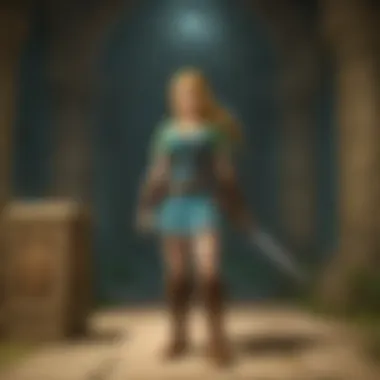
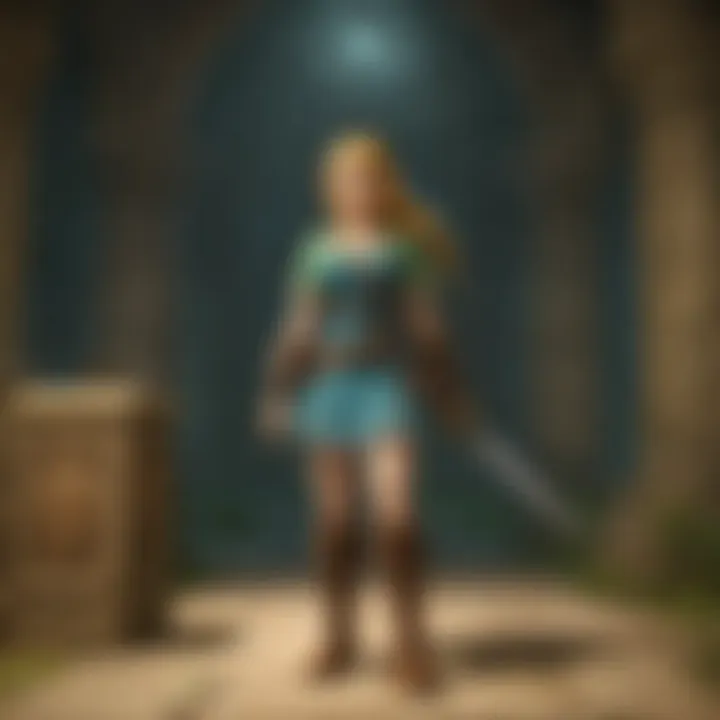
The skills of these champions do not only serve as combat tools; they also forge deeper connections between players and the gameplay experience. The intricacies of their abilities engage players in a layer of strategy that requires thoughtful application in various scenarios.
Cultural and Personal Backstories
The champions’ cultural and personal backstories enrich the narrative depth of the Zelda universe. Each champion's origins are deeply rooted in the lore of Hyrule, reflecting the diversity and complexity of its inhabitants. Take for example:
- Daruk from the Goron tribe, whose fearless spirit and duty to protect highlight a culture steeped in valor and strength. His backstory involves unwavering loyalty, emphasizing the Goron's longstanding connection to the land.
- On the other hand, Mipha’s connection to the Zora highlights themes of sacrifice and love, as her narrative is intertwined with duty and an enduring commitment to her people.
- The complexities of Urbosa’s background reveal the nuances of leadership and friendship, showcasing how cultural identities influence the champions’ motivations and actions.
Understanding these attributes helps players not just to appreciate the Zelda games on a tactical level but also to comprehend the emotional arcs that these champions embody. The backstories infuse personalities into these characters, making them relatable and significant, not merely pieces on a chessboard.
"A champion isn't just a warrior; they're a story, a legacy, and a vital thread in the epic tapestry of Hyrule's fate."
With their unique skills and multifaceted backgrounds, champions are crafted with extensive care, appealing to both gameplay mechanics and engaging storytelling. The depth of their character attributes unravels the intricate layers of the Zelda universe, creating a meaningful connection for enthusiasts and gamers alike.
The Narrative Function of Champions
The champions in the Legend of Zelda universe are not just mere avatars of strength; they serve crucial narrative purposes that enrich the overall storytelling. They act as catalysts that propel the plot forward and reveal themes deeply embedded within Hyrule's lore. The intricate connection between champions and the fabric of the narrative showcases how each character embodies distinctive qualities that resonate throughout their respective stories, making them pivotal to both gameplay and plot.
Driving Plot Development
In the landscape of the Zelda franchise, champions are designed to be integral to the storyline. Take Revali, for example. His character is not solely about archery prowess; he represents pride and ambition, often acting as a foil to Link's more humble nature. Their interactions not only provide depth to the characters but also infuse tension into the overarching narrative of Breath of the Wild. By introducing champions like Revali, the writers cleverly weave in conflicts that reflect broader themes, such as rivalry or sacrifice.
- Unique Story Arcs: Each champion's backstory contributes to the greater tale. Mipha's compassion, intertwined with her tragic fate, shines light on themes of sacrifice and love, thus affecting the player's perception as they traverse Hyrule.
- Plot Catalysts: Champions often create opportunities for quests and challenges that ultimately form the backbone of the in-game experiences. These quests are not random; they are tied to each champion's journey, motivating players to engage more deeply with the world.
"Every champion brings with them not just skills, but stories that change the way we perceive Hyrule, its challenges, and its triumphs."
As you progress through the game, players encounter situations directly tied to the champions' pasts. The more they learn about each character, the more invested they feel in the unfolding drama. The narrative structure hinges on these champions; they hold keys to ancient wisdom or magical abilities that aid in Link's quest against calamity.
Creating Emotional Connections with Players
Another significant role of champions in the Zelda universe is fostering emotional engagement with players. Through well-crafted personal stories and relatable characteristics, these figures become more than just icons; they morph into symbols of courage, loss, and hope.
- Relatable Struggles: Take Urbosa from Breath of the Wild. Her strength and leadership resonate with players who admire her protective nature, especially towards her people. This connection deepens players’ investment, revealing layers of emotional narrative that traditional gameplay often lacks.
- Backstories with Depth: The champions are designed to evoke empathy. Players may feel a sense of loss when a champion sacrifices themselves or understand the weight of legacy when they witness the struggles faced by characters like Link and Zelda. This emotional weight is what transforms gameplay from mere mechanics into a heartfelt journey.
The beauty of narrative design in the context of champions lies in the emotional arcs they provide. Their personal journeys often mirror player journeys. When players succeed, they don’t just become heroes; they embody the legacy of champions who have come before them. This deep-seated emotional connection keeps players returning to the story, cherishing each character's contribution and growth.
In summary, the narrative function of champions plays a dual role—driving plot development and nurturing emotional connections, essentially intertwining gameplay with storytelling to create a richer, more immersive experience for players exploring the breadth of Hyrule.
Gameplay Mechanics Related to Champions
The gameplay mechanics associated with champions in the Legend of Zelda universe are far more than mere systems that dictate how players interact with the game. They embody a well-thought-out design that enhances immersion and narrative depth. This section sheds light on the specific elements that underline these mechanics, their benefits, and key considerations that contribute to the overall experience.
Abilities in Combat and Exploration
One of the standout features of champions in any Zelda title lies in their unique abilities, which are vital for combat and exploration. These powers serve not only to differentiate each champion but also to enhance the strategic layer of gameplay. For instance, take Mipha, the Zora champion of Breath of the Wild. Her ability to heal Link when he is downed not only provides significant tactical advantage but also fosters dependency and camaraderie in gameplay. It instills a sense of relief for the player, knowing that help is readily available.
On the other hand, Daruk's ability to create a protective barrier offers an entirely different kind of support in scenarios that demand defense rather than offense. This distinction drives home the notion that players must gauge their situation and select champions based on the context of their challenge.
Furthermore, the exploration aspects are equally enthralling. Champions like Revali offer enhanced mobility, allowing players to traverse vast landscapes with ease. The verticality that comes with Revali's Gale opens up new pathways and strategies, encouraging players to think outside the box and discover hidden areas. This showcases how champions transform not just the combat but also the navigation through Hyrule.
Strategic Importance in Game Design
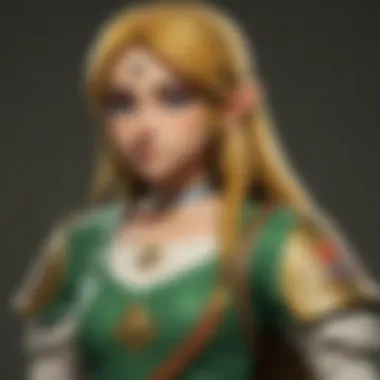
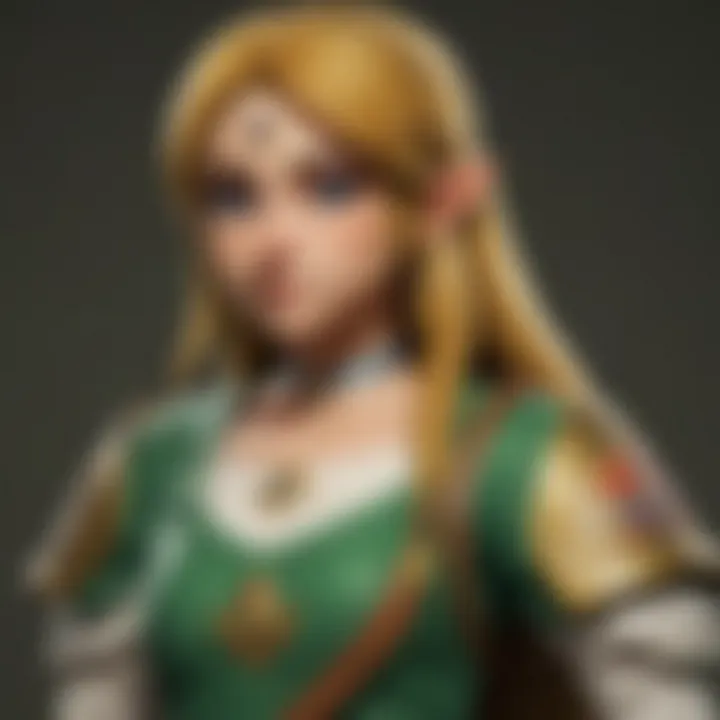
From a game design perspective, the champions introduce an intricate layer of strategy that shapes gameplay dynamics. Their abilities are meticulously balanced against the challenges presented throughout the game, creating a harmonious synergy between character skills and environmental obstacles. This design choice is seen clearly in the multiple shrines and trials scattered throughout Breath of the Wild. Each arena may favor different abilities, compelling players to not only master their chosen champions but also adjust their strategies accordingly.
Moreover, this synergy extends to collaboration among champions. By offering the player the choice to switch between champions strategically, the game invites them to form their own gameplay style and priorities. This emphasis on adaptive strategies allows players to feel connected to their choices, making each planned encounter feel personal and rewarding.
In many respects, the champions are more than just characters in a story; they represent a mechanical bridge that connects the lore and the mechanics of Zelda's world. Their integration into the gameplay serves a dual function of enriching the narrative while also empowering player agency, effectively transforming passive players into proactive participants in Hyrule's epic tale.
"The robust integration of champion abilities with gameplay creates a rich tapestry where every challenge becomes an opportunity for creativity and personal expression in strategy."
Through carefully crafted gameplay mechanics, champions elevate the Zelda experience to new heights, ensuring that each venture into Hyrule resonates with both challenge and reward.
Fan Reception of Champions
In the realm of video games, fan reception often serves as a bellwether for a title's legacy. In the Zelda universe, the champions, whether mythical or crafted from pure gameplay, resonate with players in a multitude of ways. The way fans embrace these characters speaks volumes about their impact, illustrating a connection that transcends mere pixels on a screen.
The champions are possibilities, reflections of personal aspirations or idealized traits. When players explore Hyrule, they don’t just embody Link; they become a part of a larger narrative that champions stand at the forefront of. These characters aren’t just historical figures within the game; they represent ideals, struggles, and triumphs that players relate to on a personal level. The immersion isn’t just about combat or puzzle-solving; it’s about discovering what each champion signifies.
The importance of examining fan reception lies in understanding the collective sentiment behind these characters. It provides insights into how Zelda engages its audience and why certain champions gain iconic status while others receive critique. By diving into these feelings, we uncover layers of meaning and significance that affect gameplay and storytelling alike.
Champion Popularity and Iconic Status
The champions in Zelda often cement their iconic status through gameplay experiences and narrative depth. Characters like Mipha from Breath of the Wild exemplify grace and strength yet possess their own poignant backstories, which enhance their relatability. Popularity can also stem from unique abilities that provide a distinct gaming experience. For instance, the role of Revali, with his aerial agility, introduces a different layer to exploration.
An affinity for these characters is compounded by fan art, discussions on forums, and sheer nostalgia from earlier titles. Many champions become symbols of the franchise's evolution, representing milestones in innovation and storytelling.
"The deeper a character’s backstory, the more likely they will capture the hearts of players beyond the gameplay itself."
Critiques and Discussions within the Community
While many champions are praised, discussions within the community often reveal diverse perspectives. Some fans may argue that certain champions feel underdeveloped or are limited in storytelling potential. For instance, characters like Daruk, though loved, may not resonate with all players due to perceived lack of depth compared to others. Critics often point to aspects like dialogue or background narrative as areas needing more fleshing out.
These critiques highlight the passion and investment fans have. It’s not merely about loving the champions; it’s also about wanting them to be the best they can be, reflective of player hopes and experiences. Conversations in forums or social media postings serve as a testament to engagement and a desire for deeper narratives.
In summation, fan reception of champions in the Zelda universe reveals a complex interplay of admiration, critique, and a yearning for character development. The champions embody much more than a gameplay mechanic; they are a pivotal element in the ongoing conversation about what makes Zelda a cherished franchise in the realm of gaming.
Future of Champion Creation in Zelda
The future of champion creation in the Zelda universe holds a treasure trove of possibilities, capturing the interest and anticipation of fans and players alike. As the series evolves, the champions we see on screen aren't just important for gameplay—they imbue the narrative with depth and versatility. Their backstories, abilities, and connections to Hyrule add richness to the overarching lore.
What does the future hold? With each new installment, it becomes crucial to consider how the crafting of champions will innovate, develop, and adapt to meet the expectations of a discerning audience.
Potential Innovations in Upcoming Titles
As we look ahead, the potential innovations in champion creation could take various forms:
- Expanded backstories: Developers might delve deeper into the personal histories of champions, revealing layers that change how players view them.
- Diversification of abilities: Future champions may have abilities tailored to specific gameplay mechanics, pushing boundaries and encouraging players to think strategically.
- Dynamic relationships: Introducing systems that allow the bonds between Link and champions to evolve based on player choices could add a fresh layer to the gameplay.
This immersion creates a feeling that these characters are not merely allies but integral parts of Hyrule's fabric. By enriching the narrative experience, players can connect emotionally with champions, making their victories and sacrifices feel even more impactful.
Continuing Legacy of Champions
The legacy of champions is a palpable thread that connects the past and future of the Zelda universe. Each new character not only represents their own distinct identity but also carries forward the traditions and themes established by their predecessors. They symbolize the essence of bravery, sacrifice, and resilience that resonates throughout Hyrule.
As we witness old champions morphing into new tales and familiar archetypes being revisited in fresh manners, it's clear that the fabric of Zelda isn't static; it's a living, breathing entity that continues to grow. This continuation highlights the significance of preserving the integral attributes that make champions relatable and compelling, while also inviting transformation in the face of changing player expectations.
In a way, each champion can be seen as a mirror reflecting the evolving culture of gaming itself—showcasing not only the struggles against evil but also celebrating community, collaboration, and heroism. These evolving trends will keep the spirit alive, allowing each heroic figure to forge new paths while honoring the timeless narratives that tether them to their storied lineages.
"The essence of a champion in Zelda isn't merely in their power but in the stories they tell and the bravery they inspire."
In summary, as fans, we stand at the cusp of an exciting evolution in how champions are crafted and portrayed. Anticipating these changes can enhance our engagement, ensuring that each adventure in the land of Hyrule continues to feel both new and deeply familiar.







